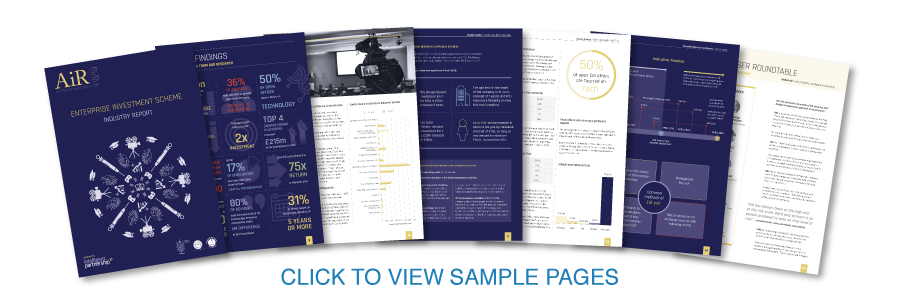EIS Industry Report 2019
Register for FREE and INSTANT ACCESS to the EIS Industry report 2019 Report

- Understand how the changes from the 2017 and 2018 Budgets have impacted the EIS market.
- Identify trends in EIS fees, both in terms of charges levied on investors and investee companies.
- Pinpoint recent changes to key EIS metrics such as target returns, capital deployment times, and underlying investment sectors.
- Be aware of the key strengths, weaknesses, opportunities and threats in the EIS market.
- Be able to benchmark current products and providers against each other on key investment criteria.
- Recognise how the adviser community is currently interacting with EIS and its areas of confidence and concern.
Our reports have been featured in
Our reports have been featured in
Brief Overview
The Enterprise Investment Scheme provided nearly £1.8bn in capital to growing businesses in 2016/17, and approximately 28,000 companies have received over £18bn in funding since the launch of EIS in 1993.
After Philip Hammond’s 2017 Autumn Budget, the scope of EIS investment areas narrowed markedly. Investments in asset backed offers were stripped from the Venture Capital Scheme, leaving EIS as a purely growth focused investment play.
Many investment managers either closed their EIS offers or pivoted their focus into new industries after the introduction of the risk-to-capital condition. One industry that is now particularly buoyant in EIS investment is the technology sector. Approximately 50% of open EIS offers are either solely focused on technology investment, or devote a significant allocation to it.
Amidst this new focus on growth, investors and advisers have to access the investment case of the underlying companies. All of which present a real risk, but also present potentially significant returns.
The latest edition of Intelligent Partnership’s EIS Industry Report examines the landscape after the rule changes to EIS. This includes how investment managers have reacted in terms of the investee companies they are focusing on; how the appetite for EIS has changed among advisers and investors; and a deep dive into the investee companies that the government wants investors to focus on.
Sponsors Quotes
“EIS investment opportunities are becoming an increasingly common tax-planning and investment tool in a financial adviser’s proposition. With other tax-efficient savings vehicles seeing individual limits being reduced, there is a genuine need and desire to look at other opportunities.”

“Recent changes in legislation, restricting the target market and increasing competition, has meant than strong deal-flow is critical to success.’’

“We wholeheartedly back the changes brought about by the Patient Capital Review and
believe there will be a flight to those managers with a clear USP and deep experience in the sectors in which they operate.”

“EIS remains a valuable tool for investors in reducing their tax burden. It now brings access to exciting high-growth companies.”

“The risk-to-capital condition has reinforced the appropriateness of EIS to back early-stage companies with outstanding prospects, and the risk of failure if the product doesn’t sell well or they don’t scale effectively.”

“EIS Investors are looking for more than just growth returns; they also want to support companies that have a positive social impact on the world.”

“Technology is not a single sector, it is a thousand different sectors and sub specialisms, many of which are totally uncorrelated.”

Comments on the EIS market
“2017 was a rollercoaster year for EIS and SEIS culminating in the November budget with a number of changes to the schemes. With many whisperings of severe restrictions being
placed on EIS and SEIS and perhaps its complete withdrawal, the eventual outcome felt like a victory for those campaigning for EIS and SEIS to continue to offer support to high growth, high risk entrepreneurial businesses.”

“While both SEIS and EIS are very valuable tax reliefs and quite rightly encourage investment to help developing companies grow, they come with a huge amount of detailed
legislation and (sometimes vague) HMRC guidance, and so while they are to be encouraged, both companies and individuals need to take detailed advice from advisers who have a good and deep knowledge of both schemes.”



























